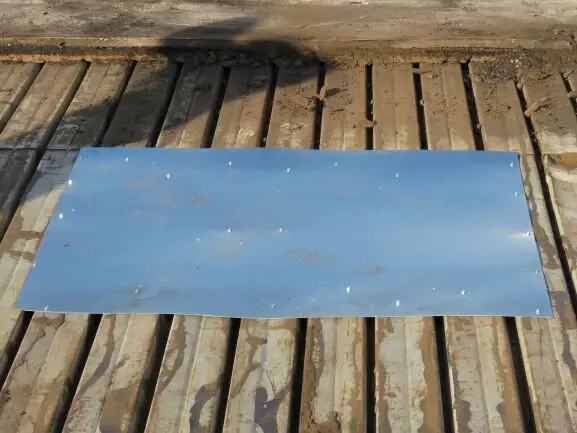I participate in the Amazon affiliate program and may earn commissions from purchases made through links on this page.
Table of Contents

Introduction
When you’re dealing with roofs, material weights are always a concern. Especially if a contractor is trying to get you to let him to store materials on the roof. You want to avoid overloading. I thought it would be a good idea if I could estimate sheet steel weights fairly accurately and without too much trouble, so I created this sheet steel weight calculator. I also made a table (see below) that goes into more detail, with corresponding values for sheet steel gauge, sheet thickness in inch decimals and millimeters, sheet weight in pounds and kilograms, and then I threw in some typical uses for each gauge just for fun.
The values used in the calculator and given in the table are standards; real-life products will vary slightly due to permissible manufacturing tolerances.
These values should not be used if extreme precision is needed for critical engineering calculations. When such precision is required, always refer to the data sheets of the actual, specific product you intend to use, or better yet, contact the technical department of the product manufacturer.
Manufacturer technical data sheets (with the sheet steel weights and thicknesses) are almost always made available on the websites of reputable manufacturers.
Sheet Steel Weight Calculator
This calculator helps you determine the weight of your sheet steel by taking into account the gauge of the sheet steel, the dimensions of the sheet, whether the steel is corrugated (the calculator adds 15%) and whether it is galvanized (the calculator adds 0.156 lb/ft²). Select options for corrugated and galvanized and enter the sheet’s length, width, and quantity, and the calculator will display both the unit weight (in lb/ft² and kg/m²) and the total weight (in lbs and kg).
Table: Sheet Steel Gauge, Thickness, and Weight
| Thickness and Weight of Sheet Steel by Gauge | |||||
|---|---|---|---|---|---|
| Gauge | Thickness: Manufacturers’ Standard Gauge (Decimal Inches) |
Weight: Pounds per Square Foot (lb/ft2) |
Thickness: Manufacturer’s Standard Gauge (Millimeters) |
Weight: Kilograms per Square Meter (kg/m2) |
Examples of Use |
| Add 0.00375 for Galvanized Steel |
Add 0.156 for Galvanized Steel |
Add 0.095 for Galvanized Steel |
Add 0.762 for Galvanized Steel |
||
| 3 | 0.2391 inch |
10 lb/ft2 |
6.07 mm |
48.824 kg/m2 |
house foundation bearing plate |
| 4 | 0.2242 inch |
9.375 lb/ft2 |
5.69 mm |
45.773 kg/m2 |
automotive leaf spring |
| 5 | 0.2092 inch |
8.750 lb/ft2 |
5.31 mm |
42.721 kg/m2 |
seawall panels, heavy retaining wall panels |
| 6 | 0.1943 inch |
8.125 lb/ft2 |
4.94 mm |
39.670 kg/m2 |
machine tool housing/cabinet |
| 7 | 0.1793 inch |
7.500 lb/ft2 |
4.55 mm |
36.618 kg/m2 |
saw mill blades |
| 8 | 0.1644 inch |
6.875 lb/ft2 |
4.18 mm |
33.567 kg/m2 |
walls of large commercial grain bins |
| 9 | 0.1495 inch |
6.250 lb/ft2 |
3.80 mm |
30.515 kg/m2 |
home safe, gun safe wall construction |
| 10 | 0.1345 inch |
5.625 lb/ft2 |
3.42 mm |
27.464 kg/m2 |
residential storm shelter wall construction |
| 11 | 0.1196 inch |
5.000 lb/ft2 |
3.04 mm |
24.412 kg/m2 |
weldable automobile frame patches |
| 12 | 0.1046 inch |
4.375 lb/ft2 |
2.66 mm |
21.361 kg/m2 |
heavy duty eave struts in steel buildings |
| 13 | 0.0897 inch |
3.750 lb/ft2 |
2.28 mm |
18.309 kg/m2 |
metal flooring plates |
| 14 | 0.0747 inch |
3.125 lb/ft2 |
1.90 mm |
15.258 kg/m2 |
heavy duty corner angle/corner braces |
| 15 | 0.0673 inch |
2.813 lb/ft2 |
1.71 mm |
13.734 kg/m2 |
tractor fenders |
| 16 | 0.0598 inch |
2.500 lb/ft2 |
1.52 mm |
12.206 kg/m2 |
roof truss gusset plates, heavy gauge roof deck |
| 17 | 0.0538 inch |
2.250 lb/ft2 |
1.37 mm |
10.985 kg/m2 |
steel wheelbarrow tub |
| 18 | 0.0478 inch |
2.000 lb/ft2 |
1.21 mm |
9.765 kg/m2 |
medium gauge roof deck, traffic signs |
| 19 | 0.0418 inch |
1.750 lb/ft2 |
1.06 mm |
8.544 kg/m2 |
auto body panels |
| 20 | 0.0359 inch |
1.500 lb/ft2 |
0.91 mm |
7.324 kg/m2 |
medium gauge roof deck |
| 21 | 0.0329 inch |
1.375 lb/ft2 |
0.84 mm |
6.713 kg/m2 |
workshop tool chest cabinet |
| 22 | 0.0299 inch |
1.250 lb/ft2 |
0.76 mm |
6.103 kg/m2 |
light gauge roof deck |
| 23 | 0.0269 inch |
1.125 lb/ft2 |
0.68 mm |
5.493 kg/m2 |
overhead/rolling door section panels |
| 24 | 0.0239 inch |
1.000 lb/ft2 |
0.61 mm |
4.882 kg/m2 |
metal parapet wall coping/ thicker roof panels |
| 25 | 0.0209 inch |
0.875 lb/ft2 |
0.53 mm |
4.272 kg/m2 |
corrugated metal roof panels |
| 26 | 0.0179 inch |
0.750 lb/ft2 |
0.45 mm |
3.662 kg/m2 |
typical standing seam metal roof panels |
| 27 | 0.0164 inch |
0.688 lb/ft2 |
0.42 mm |
3.359 kg/m2 |
foam composite garage door panel exterior skin |
| 28 | 0.0149 inch |
0.625 lb/ft2 |
0.38 mm |
3.052 kg/m2 |
substrate for lightweight insulating concrete |
| 29 | 0.0135 inch |
0.563 lb/ft2 |
0.34 mm |
2.749 kg/m2 |
lightest gauge standing seam metal roof panels |
| 30 | 0.0120 inch |
0.500 lb/ft2 |
0.30 mm |
2.441 kg/m2 |
round sheet metal pipe for HVAC ducts |
| 31 | 0.0105 inch |
0.438 lb/ft2 |
0.27 mm |
2.139 kg/m2 |
lightweight corrugated roof and wall panels |
| 32 | 0.0097 inch |
0.406 lb/ft2 |
0.25 mm |
1.982 kg/m2 |
galvanized steel step flashings |
| 33 | 0.0090 inch |
0.375 lb/ft2 |
0.23 mm |
1.831 kg/m2 |
residential plumbing vent roof jack |
| 34 | 0.0082 inch |
0.344 lb/ft2 |
0.21 mm |
1.680 kg/m2 |
toy-making, model-building |
| 35 | 0.0075 inch |
0.313 lb/ft2 |
0.19 mm |
1.528 kg/m2 |
shim stock for leveling machine parts |
| 36 | 0.0067 inch |
0.281 lb/ft2 |
0.17 mm |
1.372 kg/m2 |
“ |
| 37 | 0.0064 inch |
0.266 lb/ft2 |
0.16 mm |
1.299 kg/m2 |
“ |
| 38 | 0.0060 inch |
0.250 lb/ft2 |
0.15 mm |
1.221 kg/m2 |
“ |
Manufacturers’ Standard Gauge for Sheet Steel
The table above provides sheet steel weights and thicknesses in both US and metric according to the Manufacturers’ Standard Gauge for Sheet Steel (MSG), which is the primary commercial gauge system used by sheet steel manufacturers in the United States today.
The Manufacturers’ Standard Gauge (MSG) assumes an average density for carbon steel of 41.82 lbs per square foot per inch thick. The precise thickness for each gauge is established by the standard. The standard sheet steel weight for each gauge number is derived from these standards.
When you buy sheet steel, these are typically the weights and thicknesses you’ll be getting, although actual finished products may vary slightly according to industry-accepted manufacturing tolerances (small variations from the standard due to the practicalities of the manufacturing process).
These tolerances typically range from approximately (+ -) 8.5% for thinner gauges (e.g., 30 gauge) to about 4.5% for thicker gauges (e.g., 10 gauge and lower). If these were rocket ship parts, the tolerances would be much, much smaller. The ASTM Standards A568 (Standard Specification for Steel, Sheet, Carbon, Structural, and High-Strength, Low-Alloy, Hot-Rolled and Cold-Rolled, General Requirements for) and A924 (Standard Specification for General Requirements for Steel Sheet, Metallic-Coated by the Hot-Dip Process) describe standard sheet steel manufacturing tolerances.
A table showing values for ASTM standard sheet steel tolerances can be seen here.
The Old Standard Sheet Steel Gauge
The U.S. Standard Gauge for Sheet and Plate Iron and Steel is not the same as the Manufacturers’ Standard Gauge (MSG) and should not normally be referred to when calculating sheet steel weight. It is rarely used for commercial purposes today, except in certain legacy applications.
If you’d like to take a look at the U.S. Standard Gauge (which was established under the Standard Gauge for Sheet and Plate Iron and Steel Act of 1893 and is codified in 15 U.S. Code § 206), see this page at the Cornell Law School website.
Corrugated Sheet Steel Weight
Corrugated steel, which is used for roofing, siding, structural roof decks, and wall panels, will weigh approximately 10% to 50% more per square foot as a finished product than flat sheet steel of the same gauge due to the corrugation. The weight increase depends on the depth and frequency of the corrugation. 15% is considered an average weight increase, and I use 15% in the calculator above.
The exact increase in weight depends on the depth and spacing of the ribs, the gauge of the steel, and the specific profile of the corrugation, which varies from product to product. The weight per square foot should be available in the product data sheet for your specific product, which will typically be available on the website of the manufacturer.
Sheet Steel Gauge Measuring Tool
If you need to identify or verify the gauge of a piece of sheet steel (if you need to know the gauge of an existing steel roof deck, for example), see this useful and inexpensive tool on Amazon.

